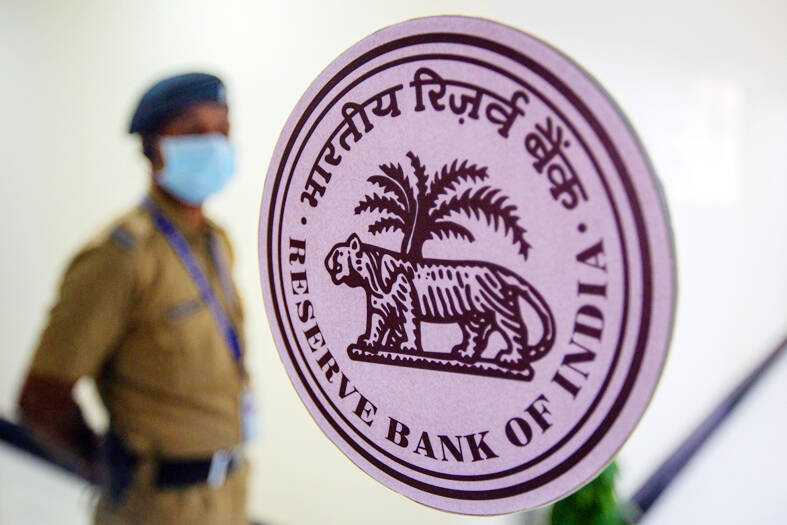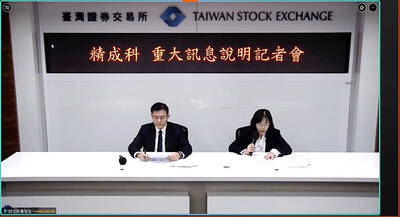A decline in core inflation pressures is critical for moderating price gains and returning them to the Reserve Bank of India’s 4 percent midpoint, a rate-setter at the Indian Monetary Policy Committee said.
The pass through of higher input cost pressures in overall prices might not be complete yet, committee external member Shashanka Bhide said, adding that rising demand “however modest and uneven” in the absence of productivity improvements would stoke prices.
The comments came after policymakers trained their eyes on elevated core inflation amid easing consumer prices. Core inflation, calculated after stripping out volatile food and energy prices, has stayed above 6 percent for 14 months in a row, while retail inflation cooled to 5.88 percent last month.

Photo: EPA-EFE
“Bringing down core inflation pressures is crucial in the overall context,” Bhide said in an interview yesterday.
Easing commodity prices and slowing demand would cool prices, but a weak rupee and the Russian invasion of Ukraine is a concern, he said.
The Reserve Bank of India has raised its policy repurchase rate by 225 basis points since May, including three half-point moves, to tame price gains.
“We need to be looking at moderate inflation on a sustained basis,” Bhide said. “We need to be moving to the target inflation rate keeping in view the impact of the cumulative policy actions and also the growth trajectory.”
His colleague Jayanth Rama Varma said in another interview that excessive rate tightening was risking India’s growth.

Honda Motor Co absorbing Nissan Motor Co could give the two struggling Japanese brands the scale they need to take on China’s BYD Co (比亞迪), sales figures released yesterday showed. Honda, which earlier this week sketched out plans for a deal that amounts to an acquisition of Nissan, sold 3.43 million cars globally in the first 11 months of this year. Nissan said it sold just over 3 million. China’s biggest automaker BYD sold 3.76 million vehicles over the same period — a clear illustration of how Nissan and Honda are weak alone, but together might have a fighting chance. Honda and Nissan

SEMICONDUCTORS: Samsung and Texas Instruments would receive US$4.75 billion and US$1.6 billion respectively to build one chip factory in Utah and two in Texas Samsung Electronics Co and Texas Instruments Inc completed final agreements to get billions of US dollars of government support for new semiconductor plants in the US, cementing a major piece of US President Joe Biden administration’s CHIPS and Science Act initiative. Under binding agreements unveiled Friday, Samsung would get as much as US$4.75 billion in funding, while Texas Instruments stands to receive US$1.6 billion — money that would help them build facilities in Texas and Utah. The final deals mean the chipmakers can begin collecting the funding when their projects hit certain benchmarks. Though the terms of Texas Instruments’ final agreement is

Call it an antidote to fast fashion: Japanese jeans hand-dyed with natural indigo and weaved on a clackety vintage loom, then sold at a premium to global denim connoisseurs. Unlike their mass-produced cousins, the tough garments crafted at the small Momotaro Jeans factory in southwest Japan are designed to be worn for decades, and come with a lifetime repair warranty. On site, Yoshiharu Okamoto gently dips cotton strings into a tub of deep blue liquid, which stains his hands and nails as he repeats the process. The cotton is imported from Zimbabwe, but the natural indigo they use is harvested in Japan —

Printed circuit board (PCB) maker Global Brands Manufacture Ltd (精成科技) is to fully acquire Japanese peer Lincstech Co for about NT$8.4 billion (US$256.9 million) as the company aims to add high-end PCBs to its PC-centric product lineups. The company also expects the deal to help expand its manufacturing sites in Southeast Asia, as local firms diversify to mitigate geopolitical risks. “The acquisition will mean an important step for the company to further expand its presence in Southeast Asia and globally,” Global Brands Manufacture chief financial officer Weng Chia-yu (翁家玉) said at a news conference in Taipei yesterday. The company has set up manufacturing